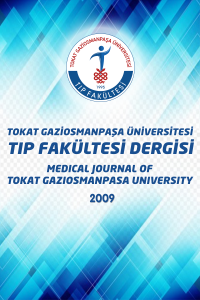Hashimoto Ensefalopatisi: Yoğun Bakım Ünitesinde Bir Olgu Sunumu
Antitiroid antikorları, Hashimoto ensefalopatisi, Hashimoto tiroiditi, Kortikosteroidler, Yoğun bakım ünitesi
Hashimoto’s Encephalopathy: A Case Report in the Intensive Care Unit
Antithyroid antibodies, Hashimoto’s Corticosteroids, encephalopathy, Hashimoto’s thyroiditis, Intensive care unit,
- ISSN: 1309-3320
- Başlangıç: 2009
- Yayıncı: Tokat Gaziosmanpaşa Üniversitesi
Travmatik Kalp Yaralanmaları: 3 Yıllık Deneyimimiz
Nuray ALTINDEĞER, Abdullah DOĞAN, İlker AKAR, İlker İNCE
Şizofrenik Hastaların Atak ve Remisyon Dönemlerinde Oksidatif Stress
Elif KILIÇ, Aybala Erek TOPRAK, Sıddıka Kesgin AYHAN, Alper BAŞ, Saadettin DURUYEN
Hatice Yılmaz DOĞRU, Asker Zeki ÖZSOY, Çiğdem Kunt İŞGÜDER, Filiz ÖZSOY, İlhan Bahri DELİBAŞ, Bülent ÇAKMAK
Hashimoto Ensefalopatisi: Yoğun Bakım Ünitesinde Bir Olgu Sunumu
Yunus Oktay ATALAY, Cengiz KAYA, Bahar ERBAŞ, Hakan SİLEK, Nurettin LÜLECİ
Akciğerin Primer Şeffaf Hücreli Şeker Tümörü: Bir Olgu Sunumu
Efnan ALGIN, Özge GÜMÜŞAY, İpek İşık GÖNÜL, Özgür Ümit AKDEMİR, Ahmet ÖZET
Diabetik Ketoasidozlu Bir Olguda Gelişen Spontan Pnömomediastinum
Mustafa KÜPELİ, Tevrat ÖZALP, Arif Hikmet ÇATAKOĞLU, Ali AKINCI
Acil Serviste Pathfast Cihazı Kullanımının Güvenilirliği ve Hasta Yönetimine Etkisi
Keziban Uçar KARABULUT, Başar CANDER
Kronik Motor Tik Bozukluğunda Topiramat Kullanımı
Hasan BOZKURT, Seda TABAK, Serkan ŞAHİN
